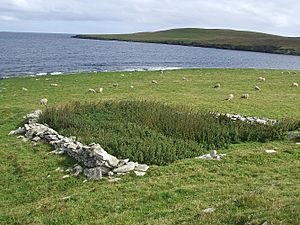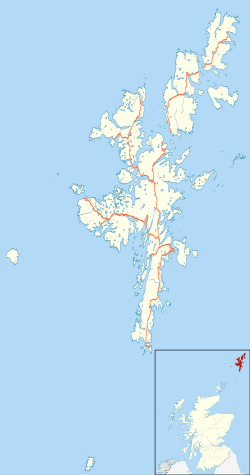Broch of Cullingsburgh facts for kids

Broch of Cullingsburgh
|
|
| Location | Shetland |
|---|---|
| Coordinates | 60°09′43″N 1°03′47″W / 60.161940°N 1.063156°W |
| Type | Broch |
| History | |
| Periods | Iron Age, Roman |
The Broch of Cullingsburgh is an ancient stone tower found in the Shetland islands. It was built during the Iron Age, a time when people started using iron tools. Brochs are special buildings found only in Scotland. They were likely used as homes and for defense.
Contents
Where is Cullingsburgh Broch?
This old broch is located on Bressay island. Bressay is just off the east coast of mainland Shetland. The Broch of Cullingsburgh sits on a raised area of ground. From here, it looks out over the Bay of Cuppa. This bay is on the east side of Bressay island.
What's Left of the Broch?
Not much of the original broch remains today. Over time, many of its stones were taken. These stones were probably used to build the nearby St. Mary's Church. This church is now also in ruins.
St. Mary's Church used to have a small village and a cemetery next to it. The area where the broch and church stand is very important. It is protected as a Scheduled Monument. This means it's a special historical site that needs to be preserved.
Amazing Finds: The Bressay Stone
Near St. Mary's Church, an important artifact was discovered in 1852. This was the Pictish Bressay Stone. The Picts were an ancient people who lived in Scotland.
The Bressay Stone is a tall, flat slab made of schist. Schist is a type of rock. It has cool designs carved into its two wide sides. On its narrow sides, there are ogham inscriptions. Ogham is an ancient alphabet that uses lines and notches.
People believe the inscription on the stone is a message. It might be a memorial for the daughter of a chieftain. A chieftain was a leader of a clan or tribe.
Today, the real Bressay Stone is on display. You can see it at the National Museum of Scotland in Edinburgh. But don't worry, a copy of the stone is still located in the cemetery on Bressay.
Images for kids



